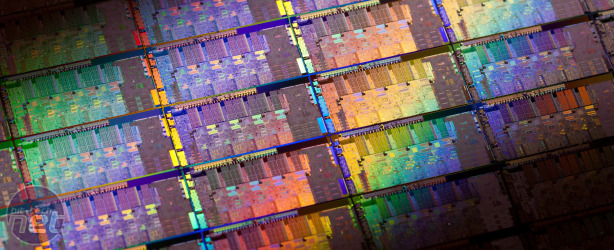Intel Core i7-2600K Review
Manufacturer: IntelUK price (as reviewed): TBC
US price (as reviewed): $317 (ex tax)
After gawping at the performance of the quad-core, non-Hyper-Threaded Intel Core i5-2500K for a while, we turned our attention to the Core i7-2600K. This 3.4GHz quad-core, eight-thread CPU dominated the performance charts in all but the most multi-threaded of applications. Only in the Cinebench R11.5 and WPrime benchmarks was any CPU faster at stock speeds, with the six Hyper-Threaded cores of the i7-980X claiming the top spot. However, this CPU costs three times as much as the relatively modestly priced i7-2600K.
With a stock-speed overall Media Benchmark score of 2,080, we couldn’t wait to see how many benchmark records we could smash with an overclocked i7-2600K. Unfortunately, we couldn’t manage to get the same 4.9GHz overclock from the CPU as we could with the i5-2500K.
However, by using a CPU multiplier of 48x without touching the Base Clock, we could wrench 4.8GHz from it. For this, we used the same voltages and settings as we used with the i5-2500K. See How to Overclock an LGA1155 CPU for more details on how we overclocked all the CPUs on test.
At 4.8GHz, the i7-2600K ripped through our Media Benchmarks, making us wince as it sailed past even a 4.4GHz i7-980X in our video encoding test (if only by 21 points). However, the extra frequency of the i5-2500K overclock gave it the lead in the image editing test, while the extra system bandwidth of its Base Clock-assisted overclock helped it to claim the top spot in the multi-tasking test.
When both K-series CPUs were overclocked, only a few points separated them, although both were 100 points faster than the 4.4GHz i7-980X, which was considerably faster than the previous-generation quad-cores and AMD’s latest 6-core CPU.
The extra frequency of the i5-2500K overclock helped it to be the fastest K-series CPU in Crysis with a minimum of 37fps rather than 42fps, but the i7-980X saved face by claiming the fastest minimum of 43fps.
The i7-2600K managed to wrestle its way to top place in X3, where its minimum of 79fps was 9fps faster than the 4.9GHz i5-2500K and 15fps faster than the i7-980X. We were again blown away by how little power the i7-2600K consumed, even when overclocked and overvolted – we saw a power draw of 234W during overclocking while the 4.4GHz i7-980X system drew 368W.
Conclusion
If you need the fastest possible PC for heavily multi-threaded applications, the Core i7-980X Extreme Edition makes a case for itself, as you can see in the Cinebench R11.5 tests. However, even in this professional-level application, the Core i7-2600K holds its own against a CPU that costs roughly three times as much.Unless your work justifies buying the very best PC no matter the cost, the Core i7-2600K is all the CPU you'll need. It's excellent for everything from gaming to consumer-level media creation and encoding, and the low power consumption will give you a cooler, cheaper PC to build and run too.
- Performance
- x
- x
- x
- x
- x
- x
- x
- x
- x
- x
- 10/10
- Features
- x
- x
- x
- x
- x
- x
- x
- x
- x
- -
- 9/10
- Value
- x
- x
- x
- x
- x
- x
- x
- x
- -
- -
- 8/10
- Overall
- x
- x
- x
- x
- x
- x
- x
- x
- x
- -
- 9/10

Intel Core i7-2600K
Specifications
- Frequency: 3.4GHz
- Core: Sandy Bridge
- Manufacturing process: 32nm
- Number of cores: 4 x physical, 4 x logical
- Cache: L1: 64KB + 64KB (each core), L2: 512 KB (each core), L3: 8MB (shared)
- Memory controller: Dual-channel DDR3, 1,333MHz
- GPU: HD 3000
- Packaging: LGA1155
- Thermal Design Power (TDP): 95W
- Features: SSE, SSE2, SSE3, SSSE3, SSE4, SSE4.2, EM64T, EIST, Execute Disable Bit, VT, AES-NI, Turbo Boost 2.0, AVX, Quick Sync Video

MSI MPG Velox 100R Chassis Review
October 14 2021 | 15:04










Want to comment? Please log in.